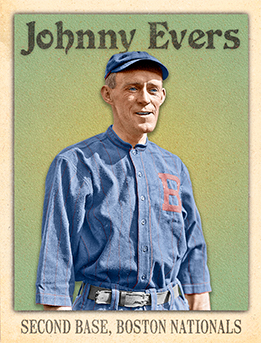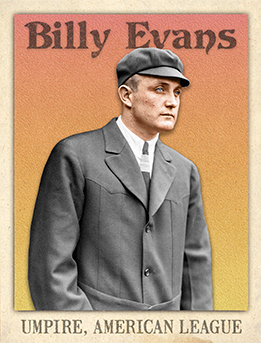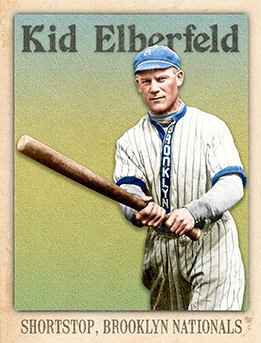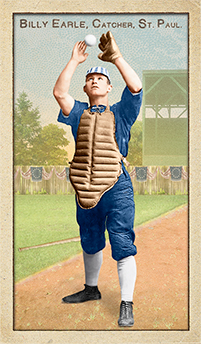
- Series: Beginnings: 1880's
- City: St. Paul
- Team: Apostles
- League: Western Association
William Moffat Earle (1867-1946) earned an outsized reputation in the game for a part-time catcher who never played more than 53 games in any of his 5 ML seasons. Long after his career ended, Bill Stern was spinning tales of how Billy was a victim of the superstitions of his day, pilloried for an “evil eye” that “creeped-out” his teammates. He began at the top of the profession, touring the world & photographed at the Great Pyramid with Al Spalding’s troupe, earning the moniker the Little Globetrotter. He was a good hitter and was lauded for his great potential during the 1889 world exhibition. That potential was never truly realized though, partly perhaps affected by Billy’s infatuation with the spirit world and hypnotism. His temperament was as erratic as his ML tenure, where he chronically jumped teams and fought over contracts.
- Had he played more, a lifetime career .286 BA certainly would have earned Earle a place on the catchers’ honor roll
- The “blacklist” insinuations are belied by Billy’s long minor league tenure and in Cuba, as player and manager
- Earle's uniform color in this card was changed from black to blue in August, 2017 to reflect recent reliable research conducted by Craig Brown and friends at Threads of Our Game. Seven cards were previously released featuring a black uniform
- Series: Diamond Heads '15
- City: Boston
- Team: Braves
- League: National League
- Hall: National Baseball Hall of Fame
John Joseph Evers (1881-1947) was immortalized as the pivot man with Joe Tinker and Frank Chance in the most famous double-play combo of all time. Evers was a good-hitting, slick-fielding 2nd baseman, winning World Series with the Cubs and Braves. A fiery-tempered man, Evers was said to have had more impact on a team than any at his position.
- The quintessential “small ball” player, Evers excelled in bunts, steals and heads-up play
- Saved a pennant race for Chicago by calling ump’s attention to Fred Merkle’s “Boner”
- Elected to Hall of Fame: 1946
- Series: Diamond Heads '15
- League: American League
- Hall: National Baseball Hall of Fame
William George Evans (1884-1956) began as the youngest ML umpire and went on to a Hall of Fame career of whom a top Yankee pitcher said “He is the best, fairest and squarest umpire in the league.” A rare official with no playing experience, Evans quickly established his credibility in a rowdy era. In “one of the most disgraceful scenes ever witnessed on a ball field” his skull was fractured by a hurled bottle in a Browns/Tigers game.
- A gifted writer and analyst of the game, authored books and was an early sports columnist
- Went on to executive positions with teams and head of the minor league Southern Association
- Elected to Hall of Fame: 1973
- Series: Diamond Heads '15
- City: Brooklyn
- Team: Robins
- League: National League
Norman Arthur Elberfeld (1875-1944), nicknamed the “Tabasco Kid” for his fiery temper and violent outbursts against umpires, covered 2nd base with a ferocity that daunted even Ty Cobb – who never slid head-first again after losing an encounter with Elberfeld’s spikes. Played mostly SS for 7 teams, 1898-1914 and was a solid hitter (.271 lifetime).
- Never afraid to take a spike, a punch or a pitch, he still ranks 13th on hit-batter list
- Career stats suffered from frequent suspensions and injuries
- Had a knack for mentoring young players, including rookie Casey Stengel
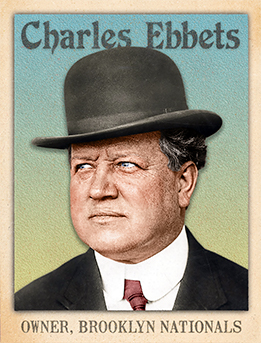
- Series: Diamond Heads '15
- City: Brooklyn
- Team: Robins
- League: National League
Charles Hercules Ebbets, Sr (1859-1925) started work for the new Brooklyn baseball team in 1883 and did just about every job possible before taking over operations in ’98. He became president of the Bridegrooms and was even the field manager that year. A tenth-place finish (out of 12 NL teams) ushered Ebbets out of the dugout and into the executive suite. A lifelong love of the game had drawn this architect/businessman/politician to the most menial of tasks for the franchise, working his way to the top upon the death of Charles Byrne. Twice he risked personal bankruptcy: in 1902 to keep the team in Brooklyn and later to buy the land and build the club’s new park. When the modest Ebbets suggested “Washington Park” as the name of the stadium, a Brooklyn Times reporter admonished him “Why don’t you call it Ebbets Field? It was your idea and nobody else’s, and you’ve put yourself in hock to build it.”
- The park he built would become the site of some of the most zany and beloved moments in all of sport

